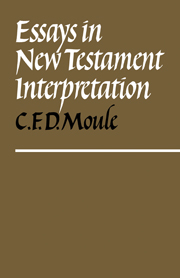Book contents
- Frontmatter
- Contents
- Foreword
- Acknowledgements
- Abbreviations
- Jesus in early Christian interpretation
- Studies in the Gospels
- Two studies in the Epistles
- Two linguistic studies
- Studies exegetical, doctrinal and ethical
- 12 The influence of circumstances on the use of christological terms
- 13 The influence of circumstances on the use of eschatological terms
- 14 St Paul and ‘dualism’: the Pauline conception of resurrection
- 15 A reconsideration of the context of maranatha
- 16 II Cor. iii.18b, καθάπερ ἀπὸ κυρίου πνεύματος
- 17 Punishment and retribution: an attempt to delimit their scope in New Testament thought
- 18 The theology of forgiveness
- 19 Obligation in the ethic of Paul
- 20 ‘…As we forgive…’: a note on the distinction between deserts and capacity in the understanding of forgiveness
- 21 The sacrifice of the People of God
- Index
13 - The influence of circumstances on the use of eschatological terms
Published online by Cambridge University Press: 05 November 2011
- Frontmatter
- Contents
- Foreword
- Acknowledgements
- Abbreviations
- Jesus in early Christian interpretation
- Studies in the Gospels
- Two studies in the Epistles
- Two linguistic studies
- Studies exegetical, doctrinal and ethical
- 12 The influence of circumstances on the use of christological terms
- 13 The influence of circumstances on the use of eschatological terms
- 14 St Paul and ‘dualism’: the Pauline conception of resurrection
- 15 A reconsideration of the context of maranatha
- 16 II Cor. iii.18b, καθάπερ ἀπὸ κυρίου πνεύματος
- 17 Punishment and retribution: an attempt to delimit their scope in New Testament thought
- 18 The theology of forgiveness
- 19 Obligation in the ethic of Paul
- 20 ‘…As we forgive…’: a note on the distinction between deserts and capacity in the understanding of forgiveness
- 21 The sacrifice of the People of God
- Index
Summary
The literature on New Testament eschatology is vast and daily vaster, and I make no pretence to have mastered it. All that I venture to offer in this paper is the suggestion that, in some of the learned discussions, an obvious but important fact is overlooked. This is the fact that, in all that they wrote about what we call eschatology, St Paul and the others were confronted – always, and not at one time any more than another – by a complex situation. That situation, from first to last, was invariably held within the tension of the incarnation itself – a tension which, by definition, can never be resolved in this life and is never amenable to progressive adjustments. The situation, therefore, always, from the very first, presented a wide variety of needs and a diversity of questions which were potentially simultaneous. It is, I suggest, when this constant fact is forgotten that theories of successive phases of thought and even of evolutionary stages of development gain more plausibility than they deserve. In an article in the J.T.S. not long ago, I tried to show that christological formulations were dominated first by one emphasis, then by another, not always according to chronological sequence but rather according to their particular purposes, whether it was worship and adoration, explanation and defence, or, perhaps, even attack. What I shall try to do now is to apply the same kind of considerations to eschatological formulations, by asking: What particular conviction did this one and that one aim to safeguard?
- Type
- Chapter
- Information
- Essays in New Testament Interpretation , pp. 184 - 199Publisher: Cambridge University PressPrint publication year: 1982



